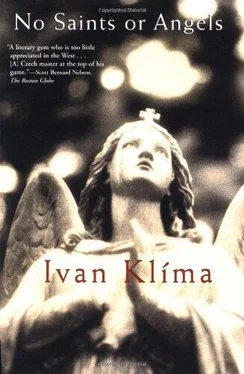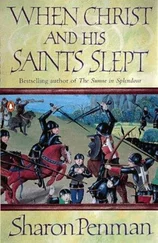'Well naturally you'd go and see it first!'
'I'll have to think about it.'
'Kristýna,' she says, 'you can think about it, but you won't come up with anything better.' She dictates me the therapist's name and address and urges me to do something about it straightaway. 'You can drop by and pick me up,' she offers. 'I'm free on Wednesday; I'll go down there with you.'
Maybe my sister really is sorry for me, or for Jana at least. I'm afraid to believe it, but even so I'm grateful for her concern. I tell her I'll cancel my Wednesday surgery and drive down.
2
My boyfriend called from Slovakia. He told me it was beautiful there and that they would like to go on to Velký Sokol and Biela Dolina.
I told him I knew how beautiful it was there and said I was glad he was having a good time. But I didn't ask him how could he be having a good time without me, if he loved me as he said he did.
He went on to say that he was sorry he couldn't be with me, but he couldn't wait to see me again.
He wasn't looking forward to me enough to come back, but why shouldn't he climb Velký Sokol just because I'm missing him?
I don't know what to do on Saturday afternoon.
I'll visit Mum, at least. Mum's always been my comforter, not because she says words of comfort but because she's always managed to put my troubles into a proper perspective. Or at least she's always heard me out and consoled me with some story from her own life when she hadn't despaired even when she'd been worse off than me.
She has come to terms with Dad's death, but visits the nearby cemetery at least twice a month and puts fresh flowers in the vase I bought. She also needlessly cleans the untarnished marble headstone. On the other hand she has started socializing with old pals of hers she didn't have time for before; she even goes to the theatre with them, something she never did in the past.
I offered to buy her a dog, a cat, or at least a parrot, so that she wouldn't have to be totally without any living soul in the flat, but she refused. She doesn't want a live companion; she would find it a burden to have to look after anyone now. On the other hand, she has bought herself loads of indoor plants — cacti and perennials — to fill every empty space in her room.
And she's laughing again, usually at herself. She even laughs in situations where other people would get annoyed or lose heart. She loves telling me stories about the absent-minded old codgers and grannies that live around there.
But I'm concerned about her physical state. Sometimes she gets nosebleeds that are hard to stop, and recently I had to take her to hospital. She is supposed to take a heart tonic and something for hypertension but she is always 'forgetting' to take her daily dose. And when I tell her off, she says she doesn't need any medicine; she feels fit and I'm making unnecessary fuss about a few drops of blood.
I have scarcely sat down before she is putting the kettle on for coffee and bringing me a piece of marble cake still hot from the oven. Then she shows me some new purple-flowering plant which she expertly describes as a cycad and wants to know the latest news of Jana.
We chat for a while about my naughty daughter and the prospects for a cure, and my mother surprises me by wanting to accept part of the responsibility or even the blame. 'You never wanted to accept your father's convictions,' she tells me, 'and I had nothing better to offer you.'
'But we're talking about Jana, not me.'
'What you never had, you can't pass on,' Mum instructs me. 'So you just gave her things instead.'
I don't ask her what I was supposed to give her.
'Your grandma still used to go to the synagogue, or so she told me,' Mum starts to recall. In fact she doesn't know whether that murdered grandmother believed in God in accordance with the Jewish faith. But if she did, she can't have been particularly strict because she didn't marry a Jew. Even so, she passed on something she had received from her forebears. But she hadn't finished passing it on before she was killed. All she left was her, my mother; but my mother was no longer able to pass anything on. It seemed to her that everything worth professing, feeling or believing had died in that dreadful war, so she passed nothing on to me.
'But Mum, you gave me the most important thing.'
'And what was that?'
'You loved me.'
'Yes, that's something to be proud of— that I wasn't a heartless mother. But you still lacked something, you know as well as I do.'
'We all lack something. And who goes to the synagogue these days? How many people go to church at all?'
'That's not what I meant.' She explains that she had in mind the chain of continuity that was broken when the Nazis were here and which she didn't try to repair afterwards. Maybe on account of Dad, too. It would have made no sense to him.
She's right on that score. Dad refused to accept things that made no sense to him. And what he didn't accept he considered wrong.
Mum waits for my reaction, but I say nothing. It's true that I lacked something. All I had was defiance. If someone had asked me what I didn't want, I'd have had an answer. But I'd have found it harder to say what I wanted. Not to he and be Hed to, maybe. To be of help to people. To live in love. All fairly trite; no lofty goals.
'I owed it to my mum and all the aunts and uncles and my grandma who all ended the same way,' my mother said with regret.
'What did you owe, Mum?'
'That's what I'm trying to explain to you. I behaved as if what had happened was a terrible misfortune, but what did I do apart from the fact that I stopped talking to my own father?'
She tells me that she failed to maintain the continuity; she broke all ties with everything she ought to have had some connection with. She no longer wanted to have anything in common with those who had come to such a dreadful end. She worked off her life, but otherwise all she did was let things go by on the nod so that my father didn't lose his temper too often. And she let us grow up without any connections either; she didn't want us ever to imagine we had anything in common with the ones that were murdered.
'There's no sense in distressing yourself like this, Mum.'
'I'm not distressing myself. I'm just thinking about you, and Jana above all. Maybe she'd be better off if she knew where she belonged.'
The trouble is, where do we really belong? I say to myself. Among six billion people at the very end of the second millennium. In a globalized world. That's the posh name they give to a situation in which hope is on the wane and the only big achievements are hypermarkets.
We belong to a world fourteen billion years after the Big Bang, my ex-husband would say. A world that will last scarcely more than several blinks of God's eye the way things are going on.
But this is just a way to make excuses for myself, to stop myself thinking about what Mum is trying to tell me, or about why so many things in my life have failed.
'I planted some honeywort on your dad's grave,' Mum says, changing the subject. 'Did you notice? No, I don't expect you've been there.'
I tell her that I have so little time these days that I scarcely manage to get to the cemetery. I prefer to visit Jana or her.
'You ought to go there from time to time, though,' she urges me. 'He was your father, after all.'
I promise I'll go sometime and it occurs to me he wasn't just Lida's father and mine. But fortunately Mum doesn't know that.
I go out into the scorching street, which is totally deserted. Everyone who could has left town. I set off in the direction of the cemetery, but I don't go that far. At Flora, I go down into the metro station, where it's cool, at least.
Besides, subconsciously I know where I'm heading. I get off in Karlín. The address of the man named Václav Alois Veselý and who is possibly my brother is already fixed in my memory. I don't know whether I'll take the plunge and pay him a visit. I don't know what I'd say. I can hardly ring the doorbell and ask some strange man, Excuse me, you don't happen to be my brother by any chance?
Читать дальше












